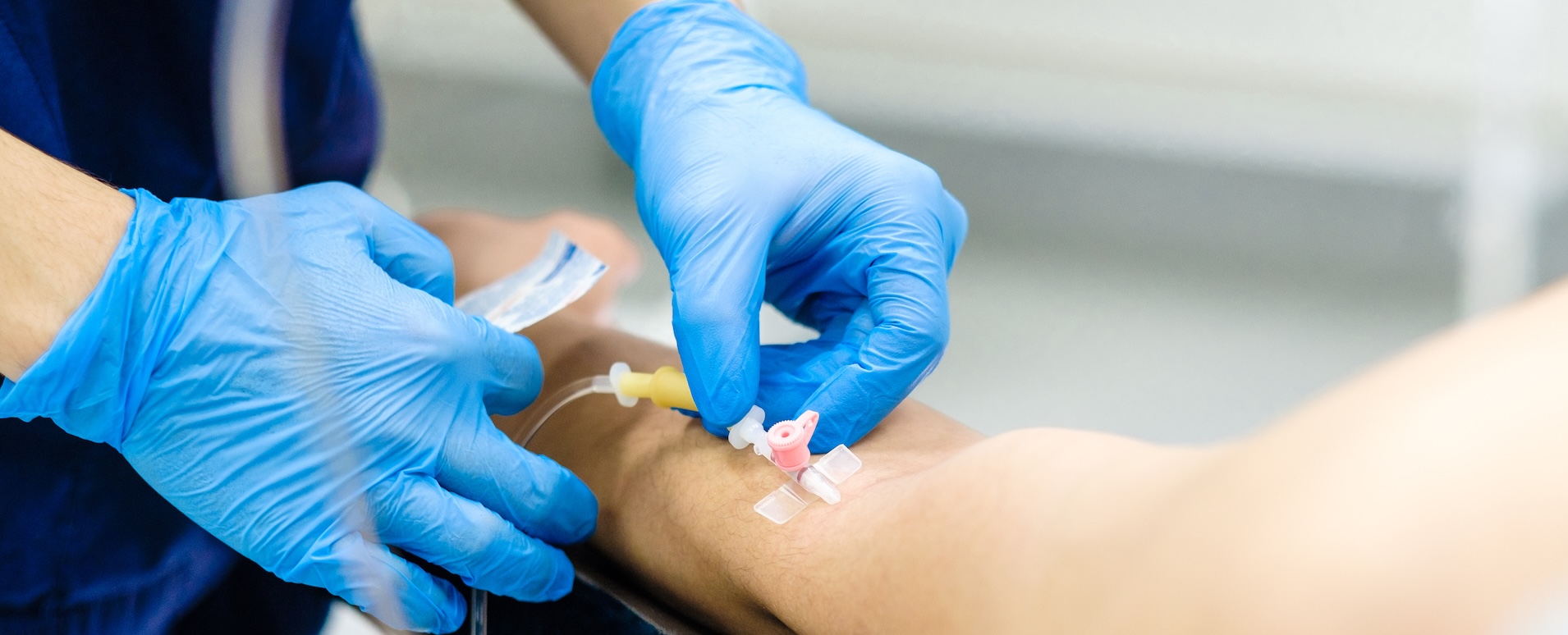A Guide to IV Antibiotics at Home After Surgery
Surgery, major or minor, is invasive and carries the risk of infection. To reduce this risk, surgical teams often prescribe intravenous (IV) antibiotics before, during, and after surgery.
Sometimes, IV antibiotics are continued for a few days or weeks after surgery to prevent post-operative infections, which, without IV antibiotic protection, can spread and delay post-operative recovery. In cases where you are going home with a known infection after surgery, you may be sent home with an order for IV antibiotics at home after surgery.
Managing IV antibiotics at home can be daunting for you and your caregivers. The nursing support available from your insurance fund will barely cover a nurse who comes out and helps you learn how to set up and administer antibiotics, leaving you and your loved ones in charge of your ongoing care. This often results in you and your caregivers feeling overwhelmed and unsupported when self-administering IV antibiotics at home after just a couple nursing visits!
In fact, it is estimated that up to 27% of people receiving IV antibiotics at home end up with complications that send them back to the hospital to be readmitted within 30 days.
That’s where private duty nurses come in. While private duty nurses make IV antibiotic administration seem safe and straightforward, they are attuned to many complex medical aspects of ensuring appropriate and effective administration of IV antibiotics after surgery.
In this guide, we’ll explore the essentials of IV antibiotics at home and how having a private duty nurse administer them benefits you and your loved ones.
What Are IV Antibiotics?
IV antibiotics are strong medications that are administered directly into the bloodstream to treat infections quickly and effectively. Unlike oral antibiotics, which must pass through the digestive system, IV antibiotics act immediately, making them the preferred choice of surgical teams to ensure a smooth and quick recovery after surgery.
The Most Common Types of Antibiotics & What They Are Used For
There are several common types of IV antibiotics used after surgery. The choice of antibiotic depends on the type of surgery and the nearby microorganisms around the parts of the body that have been operated on.
- Vancomycin is a highly specific antibiotic used to treat infections caused by Staphylococcus aureus bacteria. It is a particularly strong antibiotic as it fights strong bacteria, so often, people receiving vancomycin at home also require weekly labs to avoid dosing errors and unwanted side effects. It is often prescribed following cardiac, breast, orthopedic, and vascular surgeries.
- Ceftriaxone is a versatile antibiotic used to treat a variety of bacterial infections. It is particularly useful following surgeries where large surgical wounds are present to prevent bacteria that naturally live on the skin from entering surgical wounds and causing a post-op infection.
- Piperacillin/Tazobactam is a combination antibiotic commonly used to prevent and treat severe infections in the abdomen and lungs. It is often prescribed following abdominal surgeries that involve the stomach or intestines and cardiac surgery, where post-operative leaks and chest infections are common post-op complications.
- Meropenem is the antibiotic used when other antibiotics may not work, typically because the infection being treated is serious and complex. It is not prescribed as often as other antibiotics, as it is mainly used after organ transplants and major abdominal operations; however, it is the last line of protection when it is.
How Are IV Antibiotics Administered at Home After Surgery
Administering IV antibiotics at home requires careful planning and coordination to ensure safe and effective care. Typically, this can be broken down into three steps:
Line Insertion
To be eligible to receive at-home IV antibiotics after surgery, a semi-permanent central line is required.
To you and your caregivers, central lines look like a line coming out of your arm, when in fact, they travel from your arm all the way up to just your heart and carry substantial, life-threatening infection risks if not cared for correctly.
Once at home, a private duty nurse can look after this line with more precision and ease than you or your loved ones. From weekly dressings to regular flushing and safely securing it to your arm, a private duty nurse will ensure that your line remains free from infection and working well for the duration of your antibiotic treatment.
IV Antibiotic Preparation & Administration
For IV antibiotics to do their intended job, the correct dosage must be prepared and administered over the appropriate time frame.
IV antibiotics after surgery are either provided by a pharmacist in pre-prepared, pre-measured doses or will require preparation and dosing at home. Depending on the type of antibiotic, it may be administered in minutes with a syringe, over 30 to 60 minutes via a pump or drip, or over days with a continuous infusion pump.
Preparing and administering IV antibiotics at home requires strength and dexterity to handle fiddly equipment and precise mathematical acumen to calculate doses.
When you are recovering from surgery, you are weaker than usual, and you are often on painkillers, which can affect your concentration. While your carers may have the dexterity and arithmetic skills to prepare antibiotics for you, their loved one, they are not necessarily going to be available at the time of day the antibiotics are needed.
Because they also have their own lives and families, having a nurse prepare and administer IV antibiotics at home ensures they are administered to you precisely as your surgeon or healthcare provider prescribed them for optimal recovery.
These skilled Registered Nurses are used to double-check dosages and ensure they are correct, so leave them to prepare and administer your IV antibiotics so you can relax and recover at home after surgery.
What’s more, private duty nurses can also group other post-surgical care tasks into the time it takes for IV antibiotics to infuse, such as assessing and dressing wounds, taking vital signs, and providing reassurance, education, and support to patients and their loved ones during what can be a stressful time.
Monitoring
During IV antibiotic administration, vital signs and labs must be regularly checked for adverse reactions or complications. The line and site must also be monitored for signs of infection, irritation, blood clots, and blockages.
Navi Nurses’ RN partners are highly trained professionals with all the skills to monitor you and your line. They can seamlessly do so in a way that is so second nature, you won’t even notice. But rest assured, they will know exactly what to do and discuss with your healthcare provider should their highly skilled eye notice something that you or your carer might not.
The Crucial Role of a Private Duty Nurse in IV Antibiotics at Home After Surgery
Now that you understand the steps for administering IV antibiotics at home after surgery, you may realize there is more to the medical aspects than you thought.
Maybe you are going for surgery soon and considering the support you might need after, or perhaps you are already at home recovering from surgery, struggling to manage your own or your loved one’s IV antibiotics because the few nursing visits that your insurance provided you didn’t fill you with confidence and you are wondering where you can get help.
That’s where a Navi private duty nurse can help!
Our network of specialized private duty nurses has flexibility in the duration, frequency, nature, and timing of their visits. What’s more, clients of Navi receiving IV antibiotics after surgery say their Navi nurse makes them feel seen and respected for the humans that they are — and builds meaningful long-term connections with them and their caregivers during a complex and vulnerable time.
This is a stark contrast to the standard of nursing care funded by insurance providers, which is short-term, task-oriented, and aligned with the billing codes of the insurance provider rather than aligning with you and your care needs to safely receive IV antibiotics at home after surgery.
Ready to Invest in Your Post-Surgical Care & Recovery?
Navigating recovery can be overwhelming for you and your caregivers, particularly when your recovery involves IV antibiotics at home after surgery. With the support of a Navi private duty nurse, the medical aspects are taken care of, and an additional layer of emotional and logistical support is provided. It is a total game-changer that goes beyond convenience; it’s an investment in a smoother recovery!
So, don’t just hire any nurse after surgery. Whether you’re a person needing IV antibiotics after surgery or a caregiver seeking support, a private duty nurse can make all the difference to your post-surgical care and recovery.
Hire Navi Nurses for home care on your terms and to build your co-created care plan. Call us at (480) 630-0808 or reach out today. You’ll be heard by a medical professional right away.







